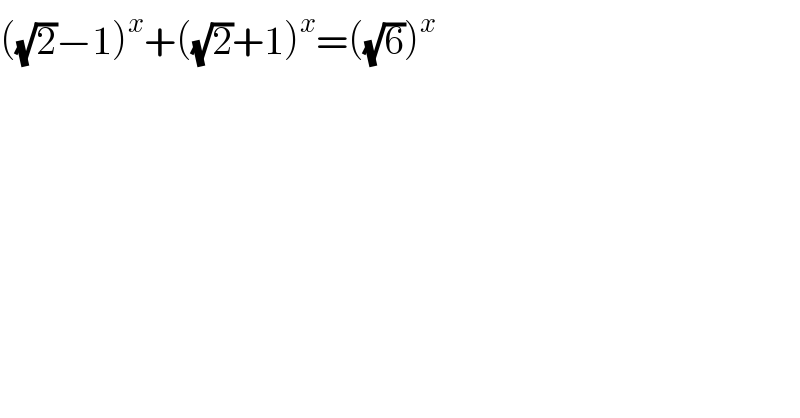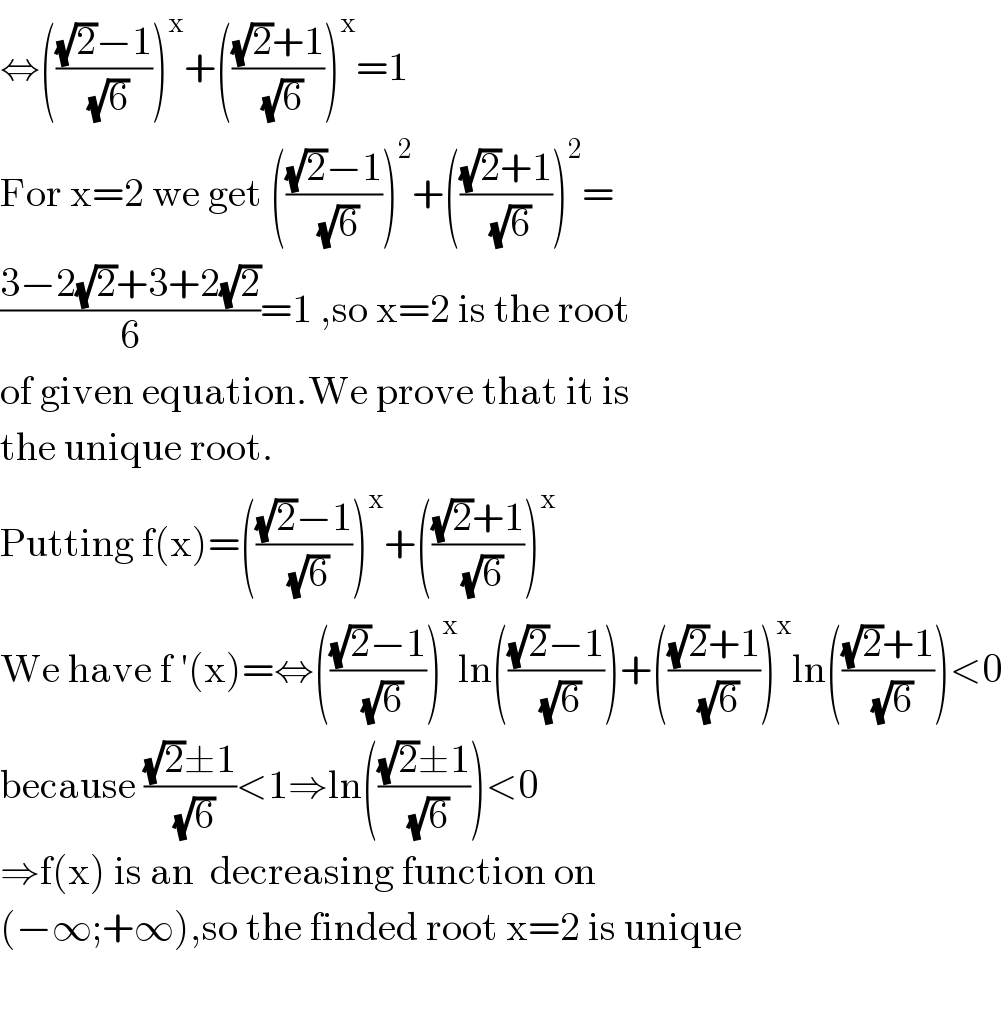
Question Number 101803 by dw last updated on 04/Jul/20

$$\left(\sqrt{\mathrm{2}}−\mathrm{1}\right)^{{x}} +\left(\sqrt{\mathrm{2}}+\mathrm{1}\right)^{{x}} =\left(\sqrt{\mathrm{6}}\right)^{{x}} \\ $$
Commented by Dwaipayan Shikari last updated on 04/Jul/20

$${x}=\mathrm{2} \\ $$
Commented by dw last updated on 04/Jul/20

$${solution}\:{step}\:{by}\:{step}\:{please}! \\ $$
Answered by 1549442205 last updated on 05/Jul/20

$$\Leftrightarrow\left(\frac{\sqrt{\mathrm{2}}−\mathrm{1}}{\sqrt{\mathrm{6}}}\right)^{\mathrm{x}} +\left(\frac{\sqrt{\mathrm{2}}+\mathrm{1}}{\sqrt{\mathrm{6}}}\right)^{\mathrm{x}} =\mathrm{1} \\ $$$$\mathrm{For}\:\mathrm{x}=\mathrm{2}\:\mathrm{we}\:\mathrm{get}\:\left(\frac{\sqrt{\mathrm{2}}−\mathrm{1}}{\sqrt{\mathrm{6}}}\right)^{\mathrm{2}} +\left(\frac{\sqrt{\mathrm{2}}+\mathrm{1}}{\sqrt{\mathrm{6}}}\right)^{\mathrm{2}} = \\ $$$$\frac{\mathrm{3}−\mathrm{2}\sqrt{\mathrm{2}}+\mathrm{3}+\mathrm{2}\sqrt{\mathrm{2}}}{\mathrm{6}}=\mathrm{1}\:,\mathrm{so}\:\mathrm{x}=\mathrm{2}\:\mathrm{is}\:\mathrm{the}\:\mathrm{root}\: \\ $$$$\mathrm{of}\:\mathrm{given}\:\mathrm{equation}.\mathrm{We}\:\mathrm{prove}\:\mathrm{that}\:\mathrm{it}\:\mathrm{is}\: \\ $$$$\mathrm{the}\:\mathrm{unique}\:\mathrm{root}. \\ $$$$\mathrm{Putting}\:\mathrm{f}\left(\mathrm{x}\right)=\left(\frac{\sqrt{\mathrm{2}}−\mathrm{1}}{\sqrt{\mathrm{6}}}\right)^{\mathrm{x}} +\left(\frac{\sqrt{\mathrm{2}}+\mathrm{1}}{\sqrt{\mathrm{6}}}\right)^{\mathrm{x}} \\ $$$$\mathrm{We}\:\mathrm{have}\:\mathrm{f}\:'\left(\mathrm{x}\right)=\Leftrightarrow\left(\frac{\sqrt{\mathrm{2}}−\mathrm{1}}{\sqrt{\mathrm{6}}}\right)^{\mathrm{x}} \mathrm{ln}\left(\frac{\sqrt{\mathrm{2}}−\mathrm{1}}{\sqrt{\mathrm{6}}}\right)+\left(\frac{\sqrt{\mathrm{2}}+\mathrm{1}}{\sqrt{\mathrm{6}}}\right)^{\mathrm{x}} \mathrm{ln}\left(\frac{\sqrt{\mathrm{2}}+\mathrm{1}}{\sqrt{\mathrm{6}}}\right)<\mathrm{0} \\ $$$$\mathrm{because}\:\frac{\sqrt{\mathrm{2}}\pm\mathrm{1}}{\sqrt{\mathrm{6}}}<\mathrm{1}\Rightarrow\mathrm{ln}\left(\frac{\sqrt{\mathrm{2}}\pm\mathrm{1}}{\sqrt{\mathrm{6}}}\right)<\mathrm{0} \\ $$$$\Rightarrow\mathrm{f}\left(\mathrm{x}\right)\:\mathrm{is}\:\mathrm{an}\:\:\mathrm{decreasing}\:\mathrm{function}\:\mathrm{on} \\ $$$$\left(−\infty;+\infty\right),\mathrm{so}\:\mathrm{the}\:\mathrm{finded}\:\mathrm{root}\:\mathrm{x}=\mathrm{2}\:\mathrm{is}\:\mathrm{unique} \\ $$$$ \\ $$
Commented by dw last updated on 04/Jul/20

$${Thank}\:{you}! \\ $$
Commented by 1549442205 last updated on 05/Jul/20

$$\mathrm{You}\:\mathrm{are}\:\mathrm{welcome}\:\mathrm{sir} \\ $$
